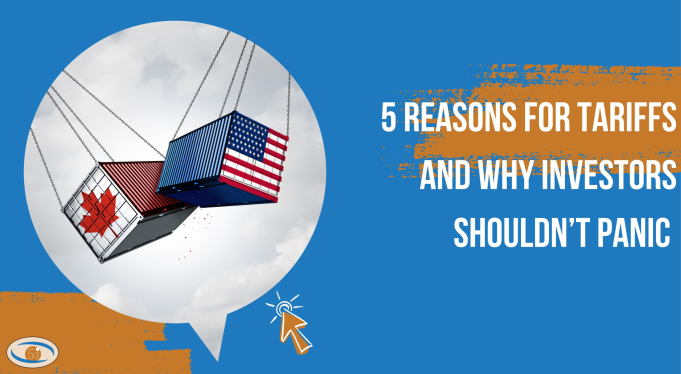Why do countries impose tariffs, what are the downsides and what should Canadian investors know
The past month, as the U.S. has been threatening and imposing tariffs on countries including Canada, we at 5i Research have been inundated with questions from our customers about tariffs and trade wars. Investors are wondering if they should sell their Canadian stocks. At the same time they worry about U.S. protectionist policies on U.S. assets, even going so far as to wonder if U.S. securities held by Canadians could be seized if things go the wrong way and the U.S. wants to exert more trade pressure on Canada. So, if selling Canada and avoiding the U.S., where should investors go?
First, as usual, our best advice is not to panic. This is not the first trade war. Stocks globally have survived dozens of such events. In addition, Canadian stock markets have had multiple months now to factor in worries, and stock valuations have adjusted somewhat. We certainly would not advise wholesale restructuring of portfolios on the possibility that something might happen. U.S. tariffs on Canada have already been delayed. They could be delayed further or reduced, or they may not happen at all. It is a moving target, certainly.
But why do countries enter trade wars at all? Everyone knows they are bad, don’t they? Well, like any stock trade, there can be differing opinions. Let’s take a look at five possible reasons the United States would put tariffs in place, and at the same time point out five negatives to the actions as well.
Protect domestic companies from unfair competition
U.S. President Donald Trump wants tariffs in order to encourage companies to set up manufacturing operations in the U.S., providing jobs to U.S. citizens and the resulting economic trickle-down. But the offset is that tariffs increase costs to everyone in the short term and induce inflation. In theory, tariffs can work. But it is the timeframe that is off here. It can take four years or more for a company to set up, say, a new steel plant in the U.S. In those years, costs for everyone rise and business slows down or disappears altogether — the exact opposite of what’s intended.
Increase demand for domestic goods
Similar to the above, tariffs are meant to make international goods more expensive, so U.S. consumers buy locally instead. Again, the goal is jobs and economic growth in the U.S. from a higher demand for domestic products. But the con is that this causes marketplace shortages, and reduces choice. Canada is a major exporter of steel and aluminum to the U.S., and with tariffs, prices of anything that uses these metals will go up. The result, of course, of higher prices is less demand, not more.
Promote local job growth
Companies seeking to avoid the impact of tariffs will buy locally, and more jobs will be created due to higher demand. In theory, this makes sense, but as we have already seen, tariffs are more likely to decrease demand. Another negative of tariffs is they simply slow overall economic growth — for all countries involved with a trade war. The foreign company sees less demand as prices rise and the domestic company may benefit in the short term, but only until inflation and economic weakness sets in.
Improve trade deficits
One of the objectives of new tariffs is to reduce the U.S. trade deficit, which was US$98.4 billion in December 2024 alone. The fact that the U.S. imports far more than it exports is viewed by some as unfair, so the idea is to try to reduce the amount that the nation imports from the rest of the world. Yes, it is possible that tariffs reduce the value and amount of goods imported into the United States. But conversely, U.S. exports will also fall, not only because of other countries’ retaliatory tariffs on U.S. exports, but also because the costs for U.S. firms producing goods for export will rise and make U.S. exports less competitive on the world market. So, with both imports and exports falling, it is quite likely the U.S. trade deficit would see no difference at all.
Hope the tariffs will punish nations with unethical trade policies
In our view, this is perhaps the only valid reason for tariffs. Some countries support their industries excessively, and have unethical and unsafe work practices. These countries can “dump” product into the U.S., which makes it very hard for U.S. companies to compete. But the products imported may be of lower quality and even unsafe. Tariffs try to make imports more expensive and thus help fight this dumping problem and its impact on U.S. companies. But, as anyone who has taken Economics 101 knows, any restriction on global trade tends to result in higher prices for everyone, as noted in the examples above as well. Yes, dumping product can be an issue. But an arbitrary tariff is not the way to solve this problem. Inspections and quality control standards would be more likely to fix the problem permanently, rather than just making everything more expensive for everyone.
Unlock the Power of Informed Investing with 5i Research!
DIY investing doesn't have to mean going it alone. At 5i Research, we're your trusted partner in navigating the stock market. Our platform offers comprehensive stock and market research, empowering you to make smart investment decisions.
- Investor Q&A: Have burning questions? Get answers from our team of experts and fellow investors in our dedicated Q&A section.
- Research Reports: With over 60 meticulously researched Canadian stocks, our reports offer in-depth analysis, giving you the confidence to invest wisely.
- Model Portfolios, Alerts, Forums, Portfolio Tracking, and Much More.
Take Care,







Comments
Login to post a comment.